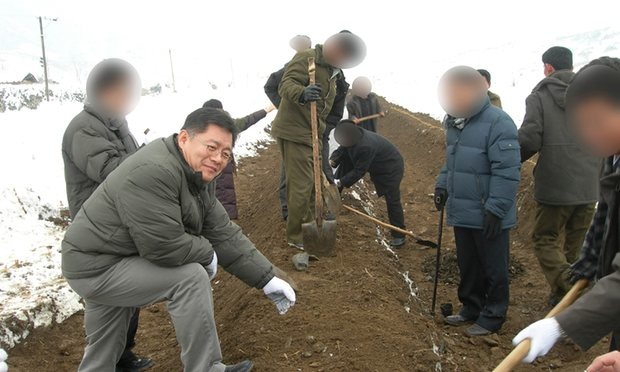We stood at the dividing line of North and South Korea, the 38th Parallel. North Korean soldiers, ramrod stiff, peered at us through binoculars as we looked from the south side of the border to North Korea, The Democratic People’s Republic of Korea: DPRK.
I knew that somewhere above the dividing line was a Canadian pastor, 60-year-old Hyeon Soo Lim, serving a life sentence of hard labor. Pastor Lim is senior pastor of the Light Korean Presbyterian Church in Mississauga, Ontario, Canada, a suburb just west of Toronto. I had met Pastor Lim when I served as president of Tyndale University College & Seminary, because some of his parishioners attended the school.

After a hundred visits to North Korea, helping to establish a caring ministry for people in need, Pastor Lim for no explainable reason was arrested in February 2015, and in December was sentenced to hard labor by the North Korean Supreme Court. They labeled his offense, “ Crimes against the state.”
North Korea, a cartoonish nation, is anything but humorous. Led by a young dictator, it continues to operate by seeming paranoia. The country is the child of the Communist revolution of the mid- twentieth century.
Becoming a pariah state
In 1910, Japan took over the Korean peninsula, a stretch of land extending from southeast China some 620 miles (1000 kilometers) south, dotted by scores of islands. At the end of WWII, Japan was defeated, and in 1945 the Korean Peninsula was divided between north and south, along the 38th parallel, with the Soviets responsible for the north and the U.S.A. for the south. Attempts for reunification broke down, war ensued, and two republics were formed. In 1948 the north invaded the south triggering the Korean War (1950-53). Today the conflict still is ongoing, with many attempts at brokering peace.
Ruled within a Marxist/Leninist ideology, all means of production are state owned. The country developed a cult like mystique around its founding leader, Kim Il-sung, giving him status and a form of worship as a messiah persona with absolute power over the country. He was followed by his son Kim Jong-il (1994). Kim Jong-un now rules a political system that is somewhere between an absolute monarchy and a hereditary dictatorship.
A Google search provides a dizzying array of bizarre and quite unbelievable stories of North Korea’s decades-long creation of a state in which its leader is deemed wise, faultless and infallible. In the 1990s a severe famine scorched its people and up to 800,000 died annually. Yet even with the enormous hardship of living, they have nuclear warheads. From a population of 25 million, 9,495,000 are in its military reserve with an active army of 1.21 million, making it after China, the U.S.A. and India, the fourth largest active army in the world. Its political philosophy is based on Juche, an idea centered on self-defense which explains their enormous attachment to military preparedness.
In such a closed society, the Kingdom message travels in the most surprising of ways. Three years ago a Christian university was completed in the DPRK, the Pyongyang University of Science and Technology (PUST). It is privately funded, largely from Evangelical communities and individuals in South Korea.
It took some years for it to become operational, but within the past few years, and now with 500 students, they are now graduating their first students, and have recently opened a school of public health, medicine and dentistry. With classes conducted in English, its professors and instructors are Christian volunteers from various countries. Before its founding, Professor Kim Chin Kyung of South Korea met personally with Kim Jong-Il and received permission to develop the school. Professor Kim was reported to have said, “While the skills to be taught are technical in nature, the spirit underlying this historic venture is unabashedly Christian.”
Such stories from North Korea remind me of what I heard about China in the 1970s and Albania in the 1980s. With the seeming absolute shutdown of freedom of any kind, and religious freedom to be sure, the Spirit was at work breaking through impenetrable barriers to provide life and hope.
What it does remind us to do is to pray. While most of us may not know of any person or group in North Korea, the energy of faith provides activities promoted by the Spirit in ways unknown to us. God calls us to pray and in time we may hear stories that validate the exercise of prayer. But even if we don’t, the activity of faith- inducing prayer serves in places we can’t imagine.
Some day the wall will fall. It always does. Today in China – a country that was estimated to have a million Christians when Mao took over in 1949 – there are now likely over a hundred million believers. I sat in a hotel restaurant in Beijing with a professor who told me his story. His father, a minister, was sent to be “retrained” in the countryside. As a boy he found his way as a student to a person who opened to him the Gospel. It is a story of faith, so extraordinary that one simply gives praise to God. His story cannot yet be told and his name not yet recorded because of the sensitive place he has today. As an Evangelical in China, he has been given opportunities as a trusted advisor. But some day we will tell his story and remember that in times when we thought there was no hope, Christ was at work bringing people into his kingdom.
Today as Pastor Lim works in hard labor in North Korea, his witness will be a means of advancing the Lord’s Kingdom. For us, praying daily for him and others is our calling and joy.
The CNN had an unusual opportunity to visit pastor Lim, interviewing him for the newscast. You can get that on http://www.cnn.com/videos/world/2016/01/11/north-korea-canadian-pastor-imprisoned-ripley-segment.cnn
Brian C. Stiller
Global Ambassador, The World Evangelical Alliance
March 2016